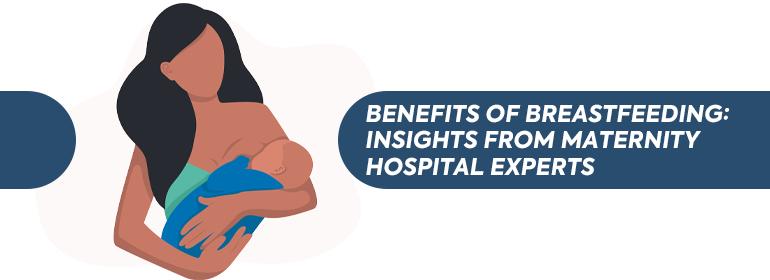Read Now
Getting your Trinity Audio player ready... |
Breastfeeding, often known as nursing, is a healthy and lovely procedure that helps mum and baby develop closeness and bonding. The connection and bonding experienced during this compassionate hug can have psychological benefits such as decreasing stress and promoting emotions of peace. Breastfeeding has numerous benefits for both the mother and the baby. Maternity hospital experts recommend breastfeeding as the best source of nutrition for newborns. In this blog, we will discuss a few benefits of breastfeeding, insights from maternity hospital experts.
Breast Milk is the best nourishment for babies. It is safe, hygienic, and includes antigens that aid in the prevention of many prevalent pediatric ailments. Breastmilk supplies all of the necessary nutrients and energy that a newborn requires throughout the first months of life as a whole and it remains to give as much as half of the nutritional requirements of a kid throughout the second half of the first year, and up to one-third of an a kid's dietary demands during the second year of life.
Breastfed children outperform non-breastfed children on IQ tests, are less prone to be overweight, and are less apt to develop diabetes later in life. Breastfeeding mothers are also less likely to develop breast or ovarian cancer. Improper marketing of substitutes for breast milk undermines global efforts to increase breastfeeding prevalence and duration.
Benefits of Breastfeeding:
1.Physical and emotional attachment:
Breastfeeding fosters mother-child bonding by encouraging skin-to-skin contact, as well as greater holding and caressing. Many specialists believe that loving connection throughout childhood helps reduce social and behavioral difficulties in both children and adults. Breastfeeding can also teach moms to interpret their infants' signs and teach newborns to trust carers. This influences a baby's early behavior.
2.Hormone stimulation:
Breastfeeding causes your body to produce the chemicals prolactin and oxytocin. Oxytocin generates a soothing, caring sensation that helps you to unwind and concentrate on your child. It also fosters strong feelings of love and bonding between you and your kid.
3.Stress reduction:
Inflammation constitutes a component of the response of the body to stress, and persons who have elevated levels of aggravation are more prone to suffer depression. Breastfeeding may assist with reducing inflammation in the mother. Inflammation reduction can reduce the likelihood of cardiovascular disease and diabetes.
4.Sleep:
Improved sleep is one of among the most significant, and perhaps most surprising, physiological benefits of breastfeeding. In fact, moms who exclusively breastfeed may find it easier to go asleep, remain asleep for a longer time and sleep more soundly.
Benefits of Breastfeeding for a baby:
Improved immune systems
- Fewer cases of diarrhea, constipation, and digestive problems
- Reduced acid reflux illness and stomach inflammation
- Reduced risk of neonatal necrotizing enterocolitis
- Fewer colds and respiratory disorders such as pneumonia, whooping cough, and other viral infections of the respiratory tract
- Less ear infections, which can impair hearing.
- There are fewer occurrences of bacterial meningitis.
- Improved eyesight and reduced chance of blindness
- Lower infant mortality rates
- Reduced incidence of Sudden Infant Death Syndrome
- Less overall sickness, with a lower probability of hospitalization
- Improved critical thinking and reasoning abilities
- Improved memory
- Language ability at a young age
- Improved motor skills
- Provides optimal nutrition: Breast milk contains all the necessary nutrients a baby needs for growth and development, including antibodies that protect the baby against illnesses.
- Reduces the risk of infections: Breastfed babies are less likely to develop infections, such as ear infections, respiratory infections, and diarrhea.
- Promotes bonding: Breastfeeding promotes skin-to-skin contact and encourages bonding between mother and baby.
- Decreases the risk of Sudden Infant Death Syndrome (SIDS): Breastfeeding has been shown to decrease the risk of SIDS by up to 50%.
- May reduce the risk of chronic diseases: Breastfeeding has been linked to a decreased risk of chronic diseases later in life, such as obesity, type 1 diabetes, and asthma.
- Saves money: Breastfeeding is free and can save families money on formula and other feeding supplies.
- May help with postpartum weight loss: Breastfeeding can help the mother lose weight gained during pregnancy and may help reduce the risk of breast and ovarian cancer.
- Supports a healthy environment: Breastfeeding produces no waste and has a low carbon footprint, making it an environmentally friendly option.
The decision to breastfeed your child is one that all parents must make. It is important to understand how nursing impacts your infant. Breast milk is easy to digest and supplies all of your baby's essential nutrients. Some folks are unable to breastfeed properly or at all, and that's fine. There are several formula alternatives available to help your baby develop. If you need assistance making a decision, consult with your baby's pediatrician. Breastfeeding may additionally assist you recover from delivery faster. Breastfeeding causes the hormone oxytocin to be produced. After birth, oxytocin helps the womb contract. This allows it to restore to its original size and decreases vaginal bleeding after birth.
Breastfeeding is also a particular and one-of-a-kind method to connect with your baby. It strengthens both psychological and physical bonds. Many individuals believe that breastfeeding can help minimize social and behavioral issues in both children and adults. Children who were breastfed as newborns are less likely to develop diseases such as leukemia and lymphoma, and they had greater vision and teeth that were more straight compared to those who were fed baby formula. Breastfeeding also reduces your baby's chances of acquiring obesity or type 1 or type 2 diabetes as an adult.
So, if you're wondering when nursing advantages finish, the answer is that they endure a lifetime. And the longer you are breastfeeding, the more health advantages you will receive. To know more about breastfeeding importance do contact our experts at Harsha Hospitals or just click here for a quick appointment.



